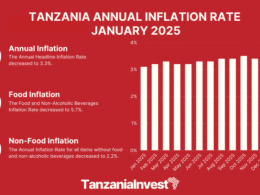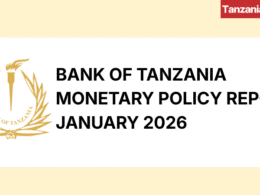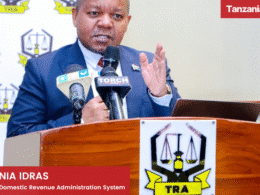TanzaniaInvest conducted an exclusive interview with Godfrey Simbeye, Executive Director of the Tanzania Private Sector Foundation (TPSF). TanzaniaInvest and Mr. Simbeye discuss the current status of the private sector in Tanzania, its challenges and the role of TPSF in fostering the dialogue between the Tanzanian private sector and the government.
Founded in 1998, TPSF has since then served as an apex and focal point for private sector advocacy and lobbying on behalf of the private sector.
TanzaniaInvest.Com : Why was TPSF established, what was the purpose and what are the achievements to date?
Godfrey Simbeye : The Tanzania Private Sector Foundation (TPSF) was established in November 1998.
At that time the government involvement in the economy decreased and market economy policies were introduced. It meant that the private sector was taking the lead in the economy.
We wanted the private sector to lead the economy, in so doing we knew the private sector would grow bigger.
So it was decided that we would have an umbrella organization.
There were so many organizations and the government cannot talk to everyone, so we needed one organization that represented the interests of the whole private sector when it comes to dialogue with government.
TPSF have about 220 members, 167 associations and corporate members like Vodacom and the banks. The indirect members of TPSF make up about 4million of Tanzania’s private sector participants. So we represent the business interests of 4 million private sector members in this country.
{xtypo_quote_left}Our biggest achievement is that we managed to convince the government to establish the Tanzanian National Business Council, the highest form of public-private dialogue in Tanzania.{/xtypo_quote_left}
Our biggest achievement since we were established 14 years ago, is that we managed to convince the government to establish the Tanzanian National Business Council (TNBC) , that is the highest form of public-private dialogue in Tanzania. It is very well-structured.
TI : What is the need for a National Business Council when there is already the TPSF talking with the government?
GS : That is a good question. The Tanzania Business Council is not an institution, it is just a platform. There are 20 members from the private sector and 20 members from the government sector who meet on this platform.
The President is the Chairman of the Council, we meet twice a year and discuss business environment issues and the investment climate. So TNBC is where we meet, a place of dialogue.
TI : From your perspective how capitalist or socialist is Tanzania? What are the issues that need to be tackled by the government in this regard?
GS : It is true that Tanzania has socialist roots. When we changed in 1992 toward a private sector lead economy, two things happened; first of all it was not surveyed what kind of private sector existed in the country and if there were any real entrepreneurs.
Secondly, when the government decided to abandon socialist principles and go into a market economy, they did not sensitize the public officials that their roles now changed, they are now facilitators of the private sector. The challenge now is changing the mindsets of the public service to accommodate the private sector.
TI : What are the current issues undermining the growth of the private sector that are in the hands of the public sector?
GS : We want the government to come up with a conducive business environment. Simple. The business environment we are talking about here is infrastructure. Let’s start with energy, energy is a problem. Government needs to improve energy supply and invest in energy infrastructure, so that private sector can get involved.
Secondly, the Port is running inefficiently, cargo takes a long time to be moved, and this incur in additional costs of doing business.
{xtypo_quote_right}Currently the Big Result Now Initiative is addressing these infrastructure issues such as energy, transport and water.{/xtypo_quote_right}
Currently the Big Result Now Initiative is addressing these infrastructure issues such as energy, transport with the central corridor development, and water.
All in all we need policies that are conducive to investment. For example we need fiscal reforms that are designed to stimulate investments, not to discourage them.
TI : What role can foreign investors play in improving the dialogue between private and public sector?
GS : They can be part of TPSF. Our organization is open to anyone who is doing business in the country. They can contribute by joining TPSF. {xtypo_quote_left} [Foreign investors] can be part of TPSF. Our organization is open to anyone who is doing business in the country.{/xtypo_quote_left}
We recently had a very constructive dialogue with the British Business Group who agreed to join TPSF to make the voice of UK businesses active in Tanzania heard.
Foreign members can contribute ideas on how the Tanzanian private sector will develop. TPSF is the platform. This is also the platform to meet the right people in government.
TI : How would you explain what is Tanzania about today to these investors?
GS : Tanzania is one of the fastest growing economies in sub-Saharan Africa. We are very stable and peaceful. That means it is a good destination for investors.
Tanzania is an open country. Tanzania is moving ahead and is evolving fast.
Tanzania will soon become an oil and gas economy. Meanwhile it still needs foreign investors, they don’t only bring in the capital but they also bring in the expertise and technology.
The government is now seriously committed to improve the business environment to be more conducive for investments via its Big Result Now Initiative.
{xtypo_quote_right}Tanzania is in my opinion one of the hottest place to invest in the next few years{/xtypo_quote_right}
All this shows that Tanzania is in my opinion one of the hottest place to invest in the next few years.
Our president stated it clearly: Tanzania will be the most attractive investment destination in 2015.
By then many things will have changed and made our country even more attractive.











